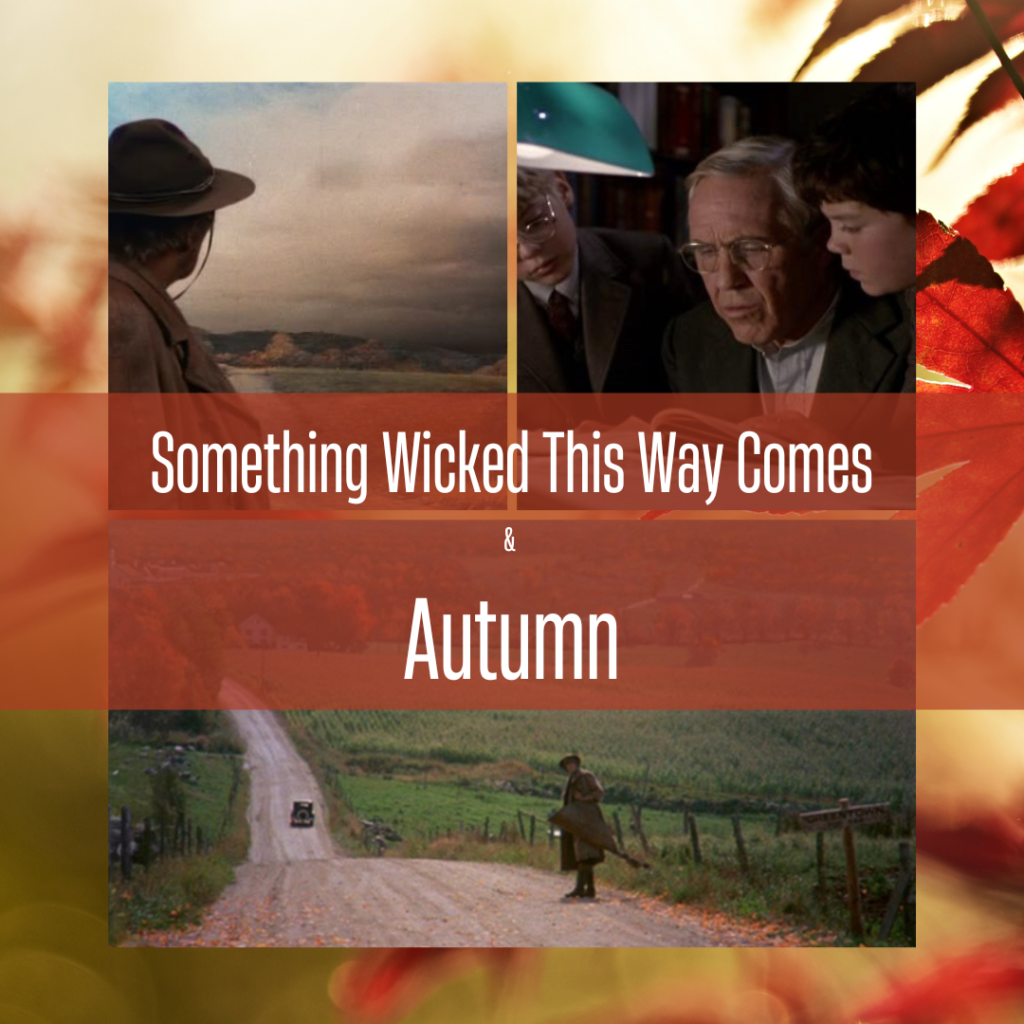Work Cited
Bradbury, Ray. “Prologue.” Something Wicked This Way Comes: A Novel, Reprint, Simon and Schuster, 2017.
*****************************************************,
The entire second chapter of Something Wicked This Way Comes is at the end of this post.
Before I start talking about chapter 2, I want to say a few words about the themes in Something Wicked This Way Comes.
![]()
From the opening sentences of the book, Bradbury makes it clear that Something Wicked This Way Comes explores the literary theme of Darkness versus Light or Evil versus Good.
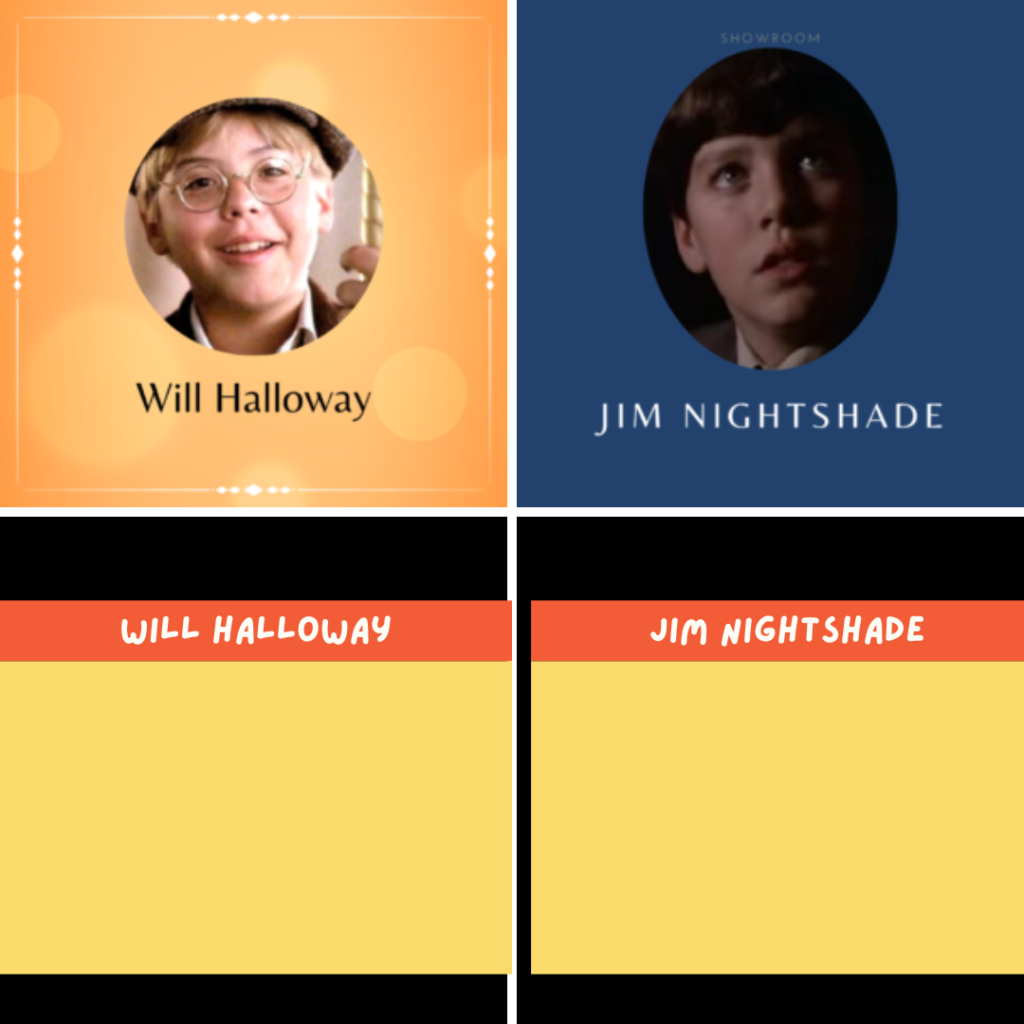
When he mentions the boy with blonde hair and the boy with black hair, he launches his exploration of that theme.
“…The first boy, with hair as blond-white as milk thistle, shut up one eye, tilted his head, and looked at the salesman with a single eye as open, bright and clear as a drop of summer rain.
…[and the second boy]
” His hair was wild, thick, and the glossy colour of waxed chestnuts. His eyes, fixed to some distant point within himself, were mint rock-crystal green.” (Bradbury 8).
Immediately before Bradbury mentioned Will in this passage, he called attention to the sun, which is the source of golden light:
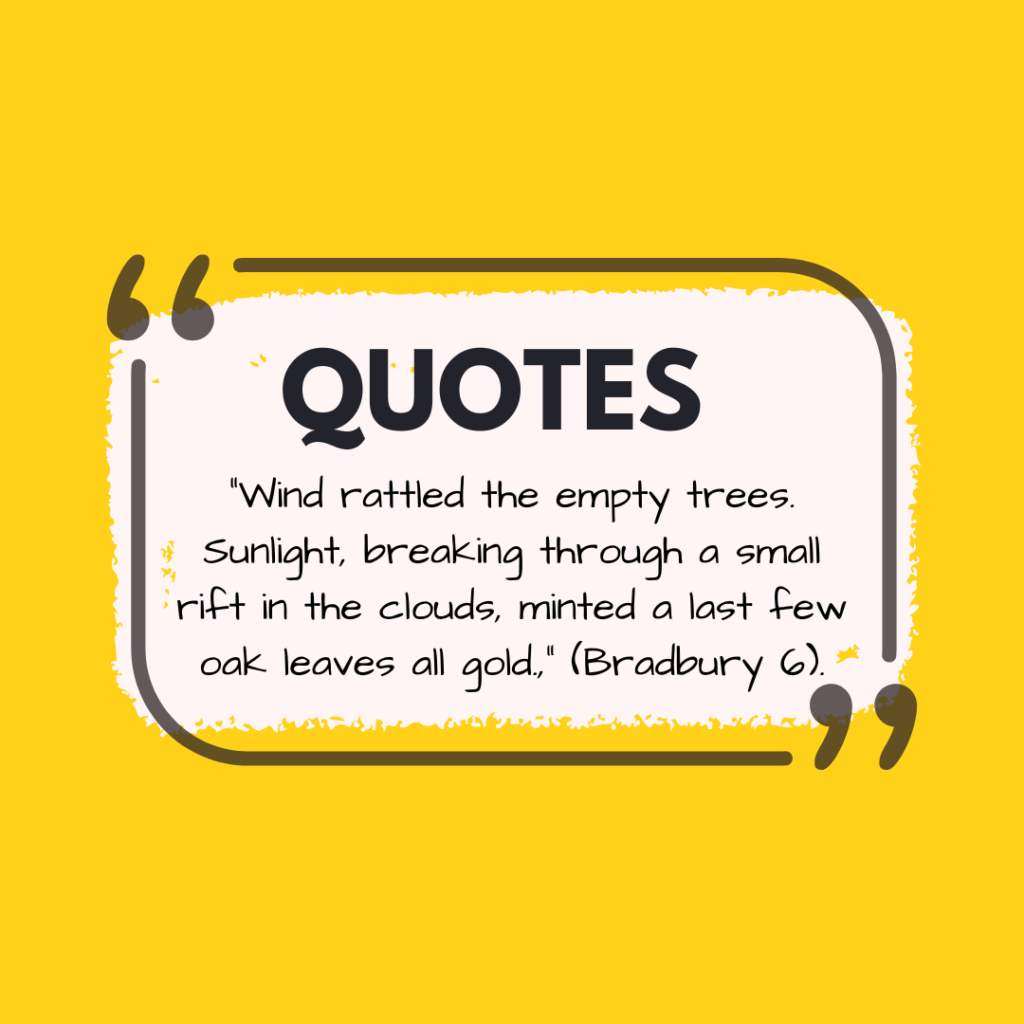

The Seasons Are Another Major Theme in Something Wicked This Way Comes. The Seasons Allude to More Than the TIme of a Year. They Allude to the Times in a Person’s Life.
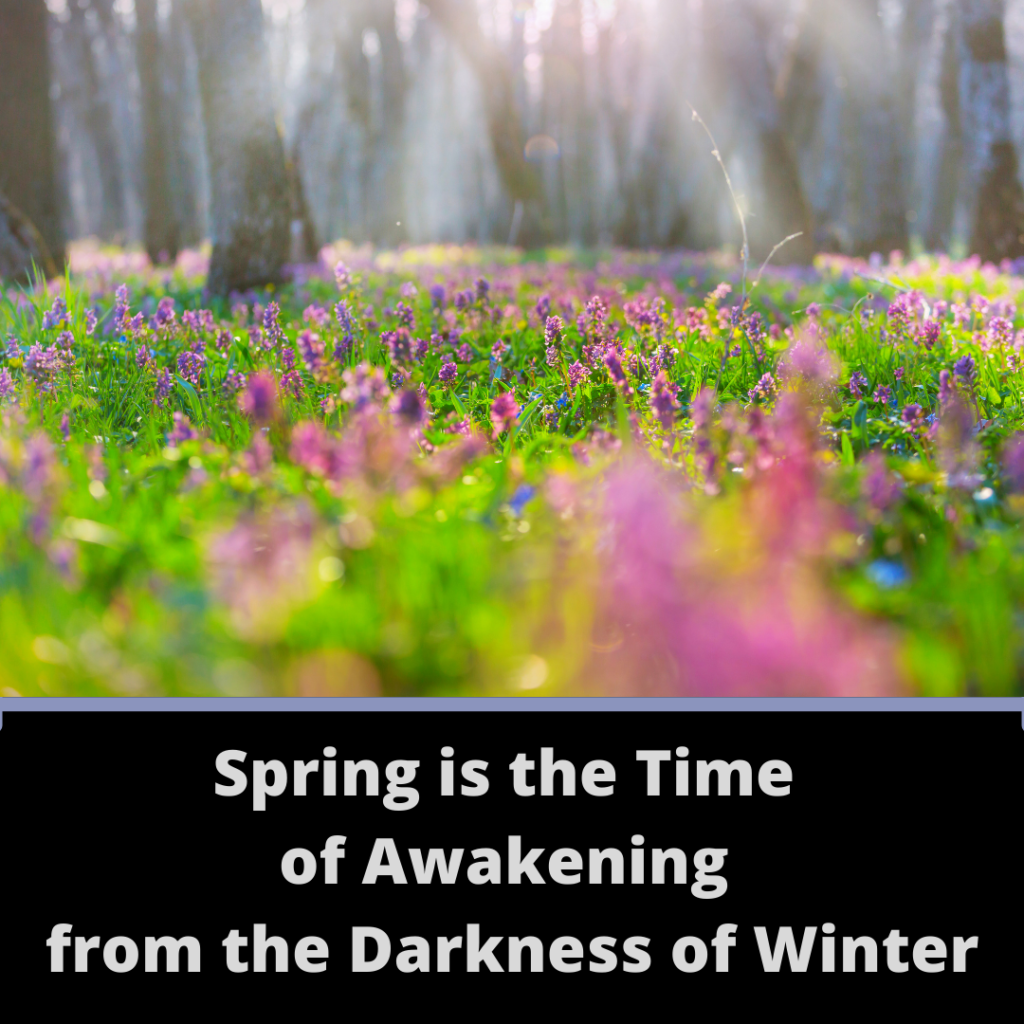
Babies and young children are in the springtime of their lives.
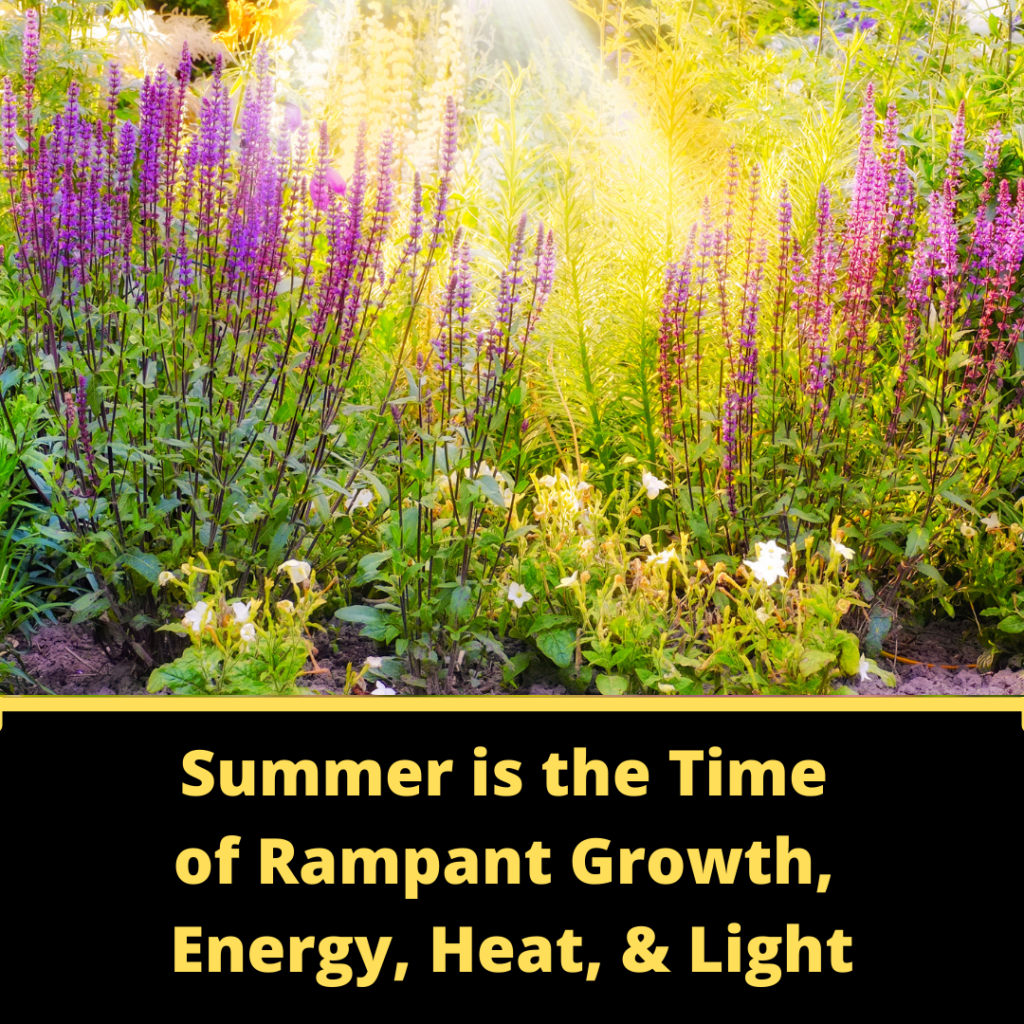
Will Halloway and Jim Nightshade are in the Summers of their lives.
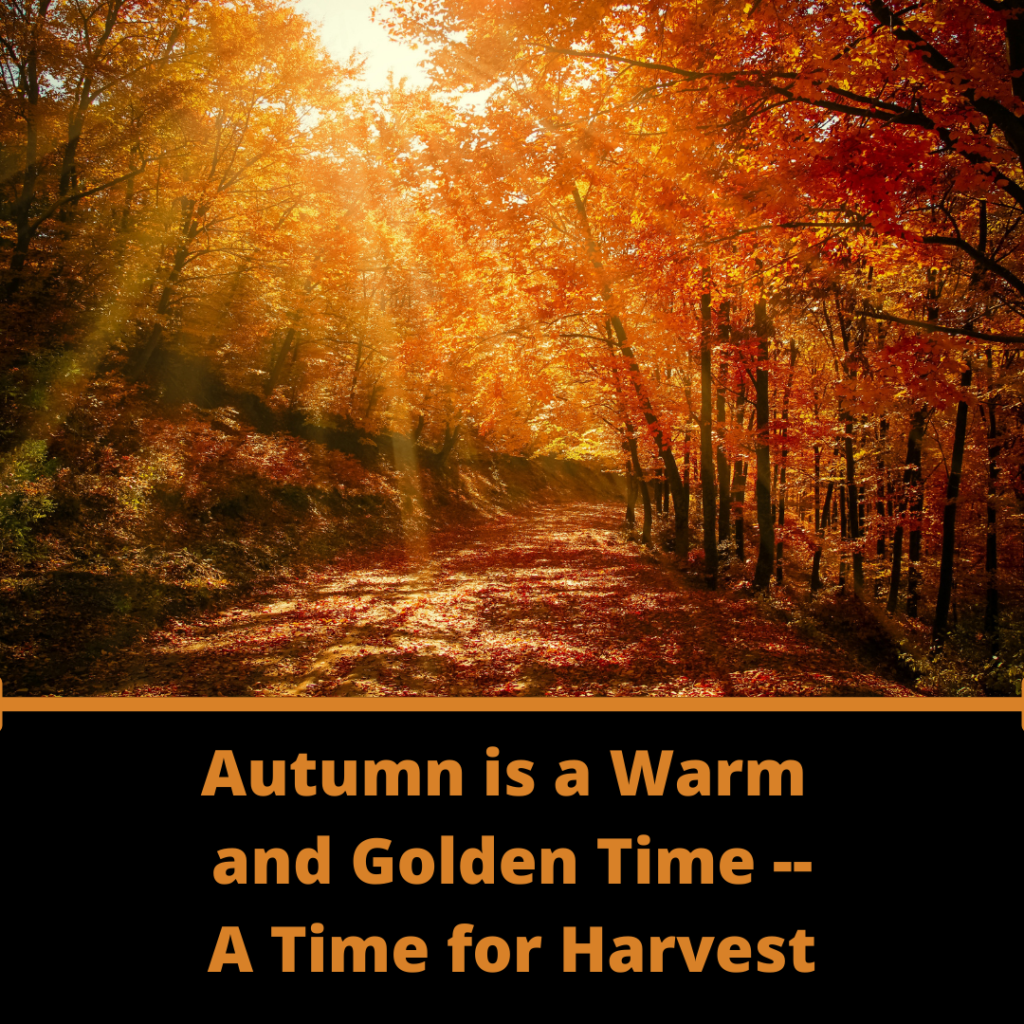
Charles Halloway is in the autumn of his life.
Something Wicked This Way Comes contrasts the seasons of the boys’ lives with that of Will’s father Charles Halloway.
Something Wicked This Way Comes Chapter 2 and Autumn: Seasons of Life
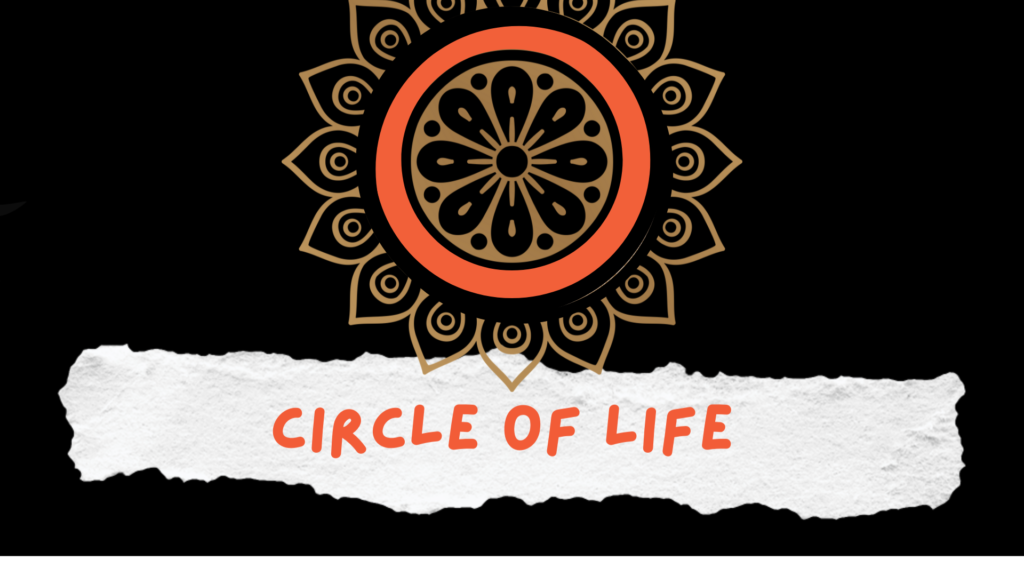
The Circle of Life is the ever-renewing cycle of the seasons. It is also the ever-renewing cycle of a day. Early morning is the metaphorical time of childhood. The afternoon is the time of older kids. Later afternoon is the time of teens. The night is the time of the elderly. Chapter 2 of Something Wicked This Way Comes begins in the latter part of the day, but when the boys arrive at the library, where Charles Halloway is working, the time is 8:00 at night.

Bradbury mentions things of Ancient Egypt several times. In chapter 1, he noted that the lightning -rod was covered with ancient symbols, including a scarab beetle. Most fantasy writers are influenced by ancient mythology, which is both a source of ancient story-telling, but it is also a glimpse into the primordial, in general–that which pre-exists time and words.
In the teachings of Zen, we are told that words – as any group of letters – are powerless–they are meaningless. Letters are mere symbols that we beg readers to somehow assimilate into meaning.

The Ancient Irish–the Celts–said that the Birds are the only creatures who can effectively communicate that meaning which is deeper than words.
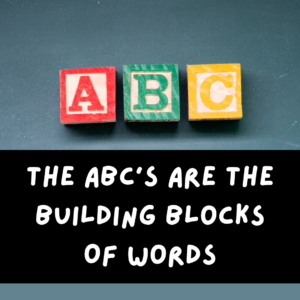
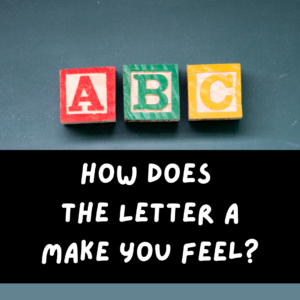
Well, somehow, I feel nothing at all about the letter “A.”
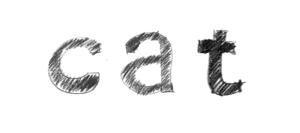
I can insert the letters “a” and “c” into a string of letters that history has told us spell a word, but again, I feel nothing about the mere letters c-a-t. We understand that those letters spell cat, and most of us have some understanding of what a cat is, but if a writer uses the word “cat” in a story or book, he must tell his reader the specifics about the cat to which he is referring.
For thousands of years, I taught art, and I always asked my students to scribble a line that showed me the feeling of love. Invariably, several of the students would draw a heart.

Let’s be honest. Does that heart make you feel giddy and silly and head over heels, out-of-this-world love? Does that heart make your heart skip a beat? No. That heart is a trivial, over-used symbol that is 1 step above meaningless–it is absolutely without feeling.
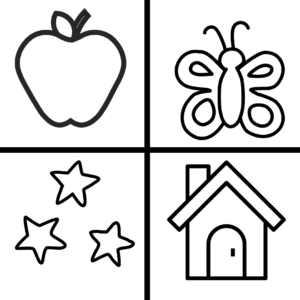
We have learned to designate many words with meaningless symbols. It is the writer’s job to ascribe meaning to the meaningless letters that are unfortunately the tools of his trade. And here is the biggie–the meaning behind any word cannot be expressed in meaningless words. Our understandings of love lie deep within ourselves in channels that run deeper than words. And how is my beautiful calico Maine Coon cat different than your cat?

All cats are not created the same.

And all c-a-ts do not spell the same cat.
An excellent writer can arrange his words in ways that help his reader will move from the meaningless outer letters of the alphabet to the internally understood meaning that is deeper than words. Ray Bradbury is one of those writers. He is a writing god. That is why we mortal writers need to study the ways that he magically transforms letters into feelings.
In chapter 2, we begin to get a glimpse of Bradbury’s craft.

Chapter 2
There’s nothing in the living world like books on water-cures, deaths of-a-thousand-slices, or pouring white-hot lava off castle walls on drolls and mountebanks.
So said Jim Nightshade, that’s all he read. If it wasn’t how to burgle the First National, it was, how to build catapults, or shape black bumbershoots into lurking bat costumes for Cabbage Night.
Jim breathed it out all fine.
And Will, he breathed it in.
With the lightning-rod nailed to Jim’s roof, Will proud, and Jim ashamed of what he considered mutual cowardice, it was late in the day. Supper over, it was time for their weekly jog to the library. Like all boys, they never walked anywhere, but named a goal and lit for it, scissors and elbows. Nobody won. Nobody wanted to win. It was in their friendship they just wanted to run forever, shadow and shadow. Their hands slapped library-door handles together, their chests broke track tapes together, their tennis shoes beat parallel pony tracks over lawns, trimmed bushes, squirrelled trees, no one losing, both winning, thus saving their friendship for other times of loss.
So it was on this night that blew warm, then cool, as they let the wind take them downtown at eight o’clock. They felt the wings on their fingers and elbows flying, then, suddenly plunged in new sweeps of air, the clear autumn river flung them headlong where they must go.
Up step, three, six, nine, twelve! Slap! Their palms hit the library door.
Jim and Will grinned at each other. It was all so good, these blowing quiet October nights and the library waiting inside now with its green-shaded lamps and papyrus dust.

Jim listened. ‘What’s that?’
‘What, the wind?’
‘Like music. . .’ Jim squinted at the horizon.
‘Don’t hear no music.’
Jim shook his head. ‘Gone. Or it wasn’t even there. Come on!’ They opened the door and stepped in.
They stopped.
The library deeps lay waiting for them.
Out in the world, not much happened. But here in the special night, a land bricked with paper and leather, anything might happen, always did. Listen! and you heard ten thousand people screaming so high only dogs feathered their ears. A million folk ran toting cannons, sharpening guillotines; Chinese, four abreast, marched on forever. Invisible, silent, yes, but Jim and Will had the gift of ears and noses as well as the gift of tongues.
[In this passage, you are introduced to Bradbury’s juxtaposition writing style:
[Ray Bradbury was a wordsmith, and he juxtaposed many sets of words together. The reader is asked to plunge into the river of cross currents that the word groups form. The images come fast, and the reader must flap around wildly, simply in an effort to survive the waves. If the reader is fortunate enough, he will have managed to glean some understanding from the groups of words–a type of understanding that is somehow richer than it might have been if any of the comparative words had been mentioned alone. Bradbury’s description of the library is another example of a long string of words and phrases that Bradbury effectively juxtaposed together:
But here in the special night, a land bricked with paper and leather, anything might happen, always did. Listen! and you heard ten thousand people screaming so high only dogs feathered their ears. A million folk ran toting cannons, sharpening guillotines; Chinese, four abreast, marched on forever. Invisible, silent, yes, but Jim and Will had the gift of ears and noses as well as the gift of tongues. This was a factory of spices from far countries. Here alien deserts slumbered. Up front was the desk where the nice old lady, Miss Watriss, purple-stamped your books, but down off away were Tibet and Antarctica, the Congo. There went Miss Wills, the other librarian, through Outer Mongolia, calmly toting fragments of Peiping and Yokohama and the Celebes. Way down the third book corridor, an oldish man whispered his broom along in the dark, mounding the fallen spices. . . . Bradbury, Something Wicked, pg. 12.
Back to Chapter 2
This was a factory of spices from far countries. Here alien deserts slumbered. Up front was the desk where the nice old lady, Miss Watriss, purple-stamped your books, but down off away were Tibet and Antarctica, the Congo. There went Miss Wills, the other librarian, through Outer Mongolia, calmly toting fragments of Peiping and Yokohama and the Celebes. Way down the third book corridor, an oldish man whispered his broom along in the dark, mounding the fallen. . . .
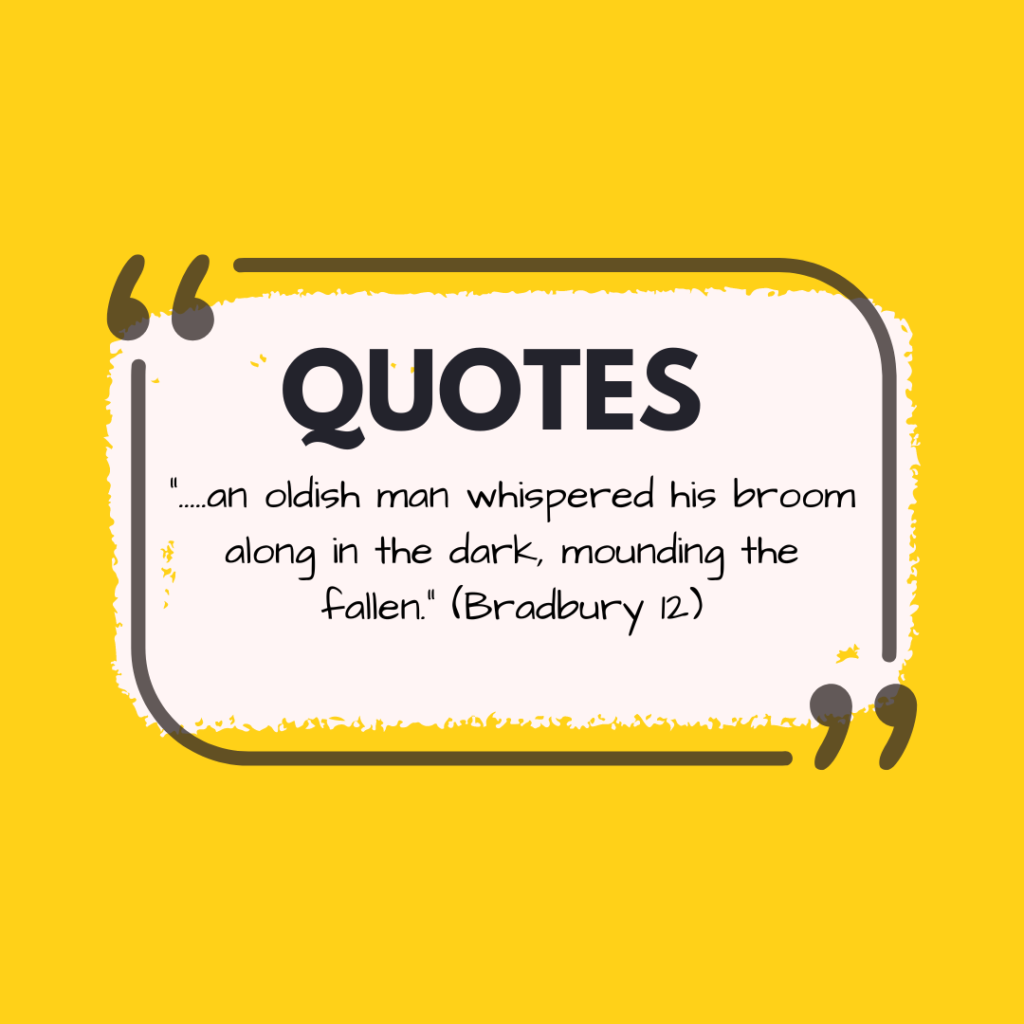
[Again, Bradbury captures tomes of information in a few well-crafted words. He reminds the reader that Will’s father is old. The father isn’t sweeping. He is whispering his broom. The word whisper is a bit of onomatopoeia. The reader can almost hear the broom skittering across the floor. The word “whisper” also tells us about Charles Halloway, who is a quiet, unassuming, almost cowardly man. And where is Halloway “whispering?” In the library, a monument that has been built to house that which has already happened–that which is over–that which is dead. When Something Wicked This Way Comes begins, Charles Halloway is part of the land of the dead. He is part of the library. The library is a symbol for Charles Halloway.]
Back to chapter 2
Will stared.
It was always a surprise – that old man, his work, his name. That’s Charles William Halloway, thought Will, not grand-father, not far-wandering, ancient uncle, as some might think, but. . .my father.
So, looking back down the corridor, was Dad shocked to see he owned a son who visited this separate 20,000-fathoms-deep world? Dad always seemed stunned when Will rose up before him, as if they had met a lifetime ago and one had grown old while the other stayed young, and this fact stood between. . . .
Far off, the old man smiled.
They approached each other, carefully.
‘Is that you, Will? Grown an inch since this morning.’ Charles Halloway shifted his gaze. ‘Jim? Eyes darker, cheeks paler; you burn yourself at both ends, Jim?’ ‘Heck.’ said Jim.
‘No such place as Heck. But hell’s right here under ‘A’ for Alighieri.’ ‘Allegory’s beyond me,’ said Jim.
‘How stupid of me,’ Dad laughed. ‘I mean Dante. Look at this. Pictures by Mister Doré, showing all the aspects. Hell never looked better. Here’s souls sunk to their gills in slime. There’s someone upside down, wrong side out.’
‘Boy howdy!’ Jim eyed the pages two different ways and thumbed on. ‘Got any dinosaur pictures?’
Dad shook his head. ‘That’s over in the next aisle.’ He strolled them around and reached out. ‘Here we are: Pterodactyl, Kite of Destruction! or what about Drums of Doom: The Saga of the Thunder Lizards! Pep you up, Jim?’
‘I’m pepped!’
Dad winked at Will. Will winked back. They stood now, a boy with corn-coloured hair and a man with moon-white hair, a boy with a summer-apple, a man with a winter-apple face. Dad, Dad, thought Will, why, why, he looks. . .like me in a smashed mirror!
And suddenly Will remembered nights rising at two in the morning to go to the bathroom and spying across town to see that one single light in the high library window and know Dad had lingered on late murmuring and reading alone under these green jungle lamps. It made Will sad and funny to see that light, to know the old man – he stopped to change the word – his father, was here in all this shadow. ‘Will,’ said the old man who was also a janitor who happened to be his father, ‘what about you?’ ‘Huh?’ Will shook himself.
‘You need a white-hat or a black-hat book?’ ‘Hats?’ said Will.
‘Well, Jim – ‘ they perambulated, Dad running his fingers along the book spines – ‘he wears the black ten-gallon hats and reads books to fit. Middle name’s Moriarty, right, Jim? Any day now he’ll move up from Fu Manchu to Machiavelli here – medium-size dark fedora. Or over along to Dr Faustus – extra large black Stetson. That leaves the white-hat boys to you, Will. Here’s Gandhi. Next door is St Thomas.
[This is another allusion to Dark versus Light. Jim metaphorically wears the black hat and Charles Halloway compares him to the evil Moriarty in Sherlock Holmes, Machiavelli, and Faustus. On the other hand, he compares Will to Buddha.]
And on the next level, well. . .Buddha.’
‘You don’t mind,’ said Will, ‘I’ll settle for The Mysterious Island.’ ‘What,’ asked Jim, scowling, ‘is all this talk about white and black hats?’
‘Why – ‘ Dad handed Jules Verne to Will – ‘it’s just, a long time ago, I had to decide, myself, which colour I’d wear.’
‘So,’ said Jim, ‘which did you pick?’
Dad looked surprised. Then he laughed uneasily.
‘Since you need to ask, Jim, you make me wonder. Will, tell Mom I’ll be home soon. Get out of here, both of you. Miss Watriss!’ he called softly to the librarian at the desk. ‘Dinosaurs and mysterious islands, coming up!’
The door slammed.
Outside, a weather of stars ran clear in an ocean sky.
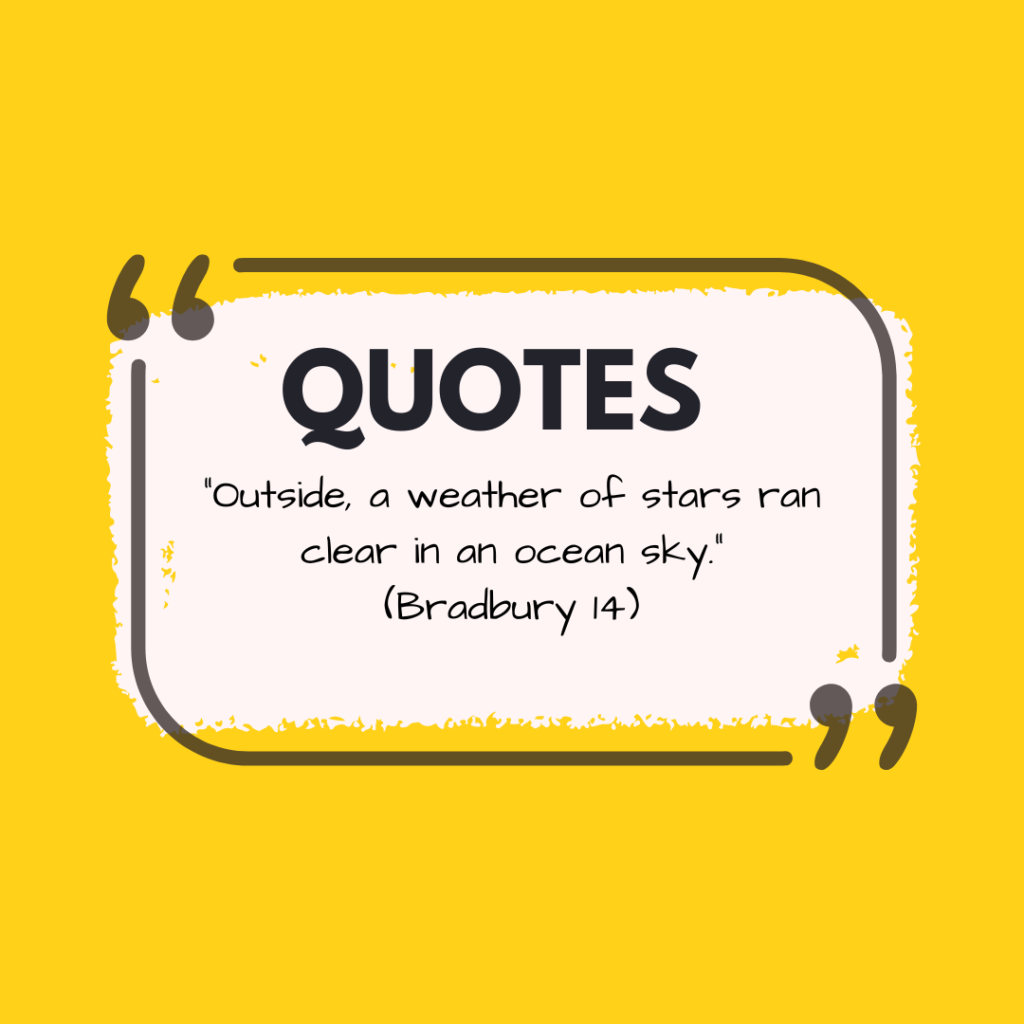
[Although we are reading about the contrasts of good and evil, Bradbury alludes to the stars, which I call the Lights in the Night–or the flickers of hope. ]
Back to chapter 2
‘Heck.’ Jim sniffed north, Jim sniffed south. ‘Where’s the storm? That darn salesman promised. I just got to watch that lightning fizz down my drainpipes!’
Will let the wind ruffle and refit his clothes, his skin, his hair. Then he said, faintly, ‘It’ll be here. By morning.’
‘Who says?’
‘The huckleberries all down my arms. They say.’ ‘Great!’
The wind flew Jim away.
A similar kite, Will swooped to follow.
page 15
